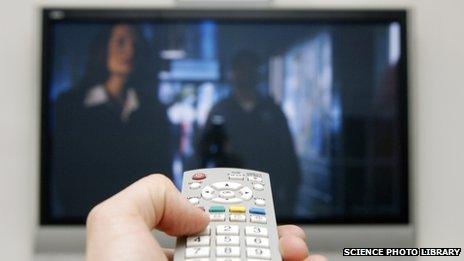TV licence law change proposal receives strong support from MPs
- Published

A proposal to end the criminal offence of watching TV without a licence is being considered for inclusion in a bill before Parliament.
Conservative MP Andrew Bridgen said his call to make non-payment a civil matter had gained the support of 150 MPs.
Ministers had said they wanted to defer a decision until BBC charter renewal talks in 2016 - but they could seek to gain the power to change the law now.
The BBC has said it fears a change may lead to more people failing to pay.
The Ministry of Justice said that 164,932 people were found guilty of TV licence evasion in 2012 and 51 went to prison for not paying subsequent fines.
Mr Bridgen, the MP for North West Leicestershire, has said he is concerned at the number of people who are brought into the criminal justice system "for such a minor offence".
'Banana republic'
In the Commons, he asked Justice Secretary Chris Grayling: "Given the level of support across this House to see the decriminalisation of non-payment of the TV licence fee does my right honourable friend agree with me that continued criminalisation of people whose only crime is being poor is completely untenable?"
He had told the BBC last week that one in nine cases before magistrates' courts in 2012 related to not paying the licence fee.
"It's a huge problem, a huge burden on the magistrates' courts," he said.
"If the BBC were to find out that a banana republic country... announced that they were going to have a poll tax to allow people to have access to television, regardless of income, and threaten people with criminal prosecution and imprisonment, and that the majority of people in prison would be women with children, there would be an outcry in this country.
"But that's what we've got."
His amendment to the Deregulation Bill could go before MPs as early as 25 March.
Mr Grayling said: "I have a lot of sympathy with what my honourable friend says. This is an issue we're giving careful consideration to."
The licence fee comes up for renewal in 2016, while the BBC's Royal Charter, which sets out the corporation's role, functions and structure, is due for renewal the following year.
BBC political correspondent Gary O'Donoghue said there had been a reluctance to implement the change straight away because it would waste a significant negotiating tool when ministers come to discuss the renewal of the BBC's Charter.
But our correspondent added that, with the proposals gaining support, a compromise with MPs was in the offing. Ministers could be given the power now to make non-payment a civil offence, retaining the option to implement the change during discussions with the corporation.
'Perverse effects'
The BBC has been lobbying MPs in the past few days, telling them the corporation is "very concerned" about the idea.
A letter from the head of the BBC's corporate affairs department, Andrew Scadding, to one Tory MP, says the proposal could damage services without delivering any demonstrable benefit to those who struggle to pay.
In an article for the ConservativeHome website, external, Mr Scadding said that the "vast majority" of licence-fee evasion cases were "heard uncontested and in bulk".
"Average presentation time is only three minutes," he said.
"They therefore account for a significantly smaller proportion of court time than their numbers might suggest - 0.3% in the most recent data we have seen."
He also suggested the move could have some "perverse effects".
"For example, a civil fixed penalty would need to be set at a sufficiently high level to deter evasion, and that could well end up hitting the less well off harder," he said.
Last week, the corporation's strategy director, James Purnell, suggested it would increase non-payment and cost the BBC £200m.
The sum was the equivalent of BBC Four, CBBC and CBeebies, which would have to be taken off air, Mr Purnell said at an event to relaunch the iPlayer service.
In a statement, a BBC representative said: "Legislation is a matter for the government. However, changing the law could lead to higher evasion. Just a 1% increase in evasion would lead to the loss of around £35m, the equivalent of around 10 BBC local radio stations."
A Department for Culture, Media and Sport representative said: "The government thinks this is an interesting idea but timing is crucial and decriminalisation of the licence fee should be on the table during charter review, not separate to the process."
- Published12 March 2014
- Published10 March 2014
- Published8 March 2014
- Published24 February 2014
- Published2 January 2014